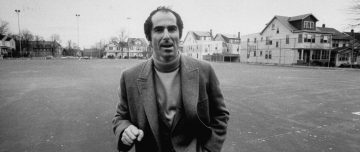Alex Perez in Tablet Magazine:
 The woke literati have trouble understanding how a Cuban American whose first language is Spanish can feel a deep kinship with writers like Richard Ford and Barry Hannah, a pair of Southerners who look absolutely nothing like me and certainly don’t sound like me, because they can’t comprehend that the Southern male experience and the Hispanic male experience—as well as most other male experiences—are more alike than not. I read Roth and Carver and the rest of the problematic male crew because, above all other contemporary classifications, I identify as a man. The fact that I was born to Cuban parents and live in a predominately Hispanic community has always been secondary to my maleness, which is why I so strongly connected and continue to connect with unabashedly masculine writers who tackle classically heterosexual male concerns. Questions of creed or color were never at the forefront for me, because to be a young man, for better or worse, is to be ruled by your manhood, which is why my main concerns as a reader and a writer have always been boyhood and manhood and all the permutations in between.
The woke literati have trouble understanding how a Cuban American whose first language is Spanish can feel a deep kinship with writers like Richard Ford and Barry Hannah, a pair of Southerners who look absolutely nothing like me and certainly don’t sound like me, because they can’t comprehend that the Southern male experience and the Hispanic male experience—as well as most other male experiences—are more alike than not. I read Roth and Carver and the rest of the problematic male crew because, above all other contemporary classifications, I identify as a man. The fact that I was born to Cuban parents and live in a predominately Hispanic community has always been secondary to my maleness, which is why I so strongly connected and continue to connect with unabashedly masculine writers who tackle classically heterosexual male concerns. Questions of creed or color were never at the forefront for me, because to be a young man, for better or worse, is to be ruled by your manhood, which is why my main concerns as a reader and a writer have always been boyhood and manhood and all the permutations in between.
It is this unabashed masculinity, and not whiteness, that my woke-reader friends find repellent, which explains their disgust at the mere mention of any of the great masculine writers. In their eyes, it is a great sin, no doubt, to be white, but to be a traditionally masculine man has seemingly trumped even whiteness as America’s greater cultural sickness. A white person afflicted by their terrible, repellent whiteness might possibly even be rehabilitated, but a masculine young man, irrespective of race, is inherently toxic.
Our experts and tastemakers seem to think that the attempted eradication of traditional masculinity will make for a healthier society—it won’t—but what happens to the young men who, instead of transcending their manhood, choose to understand it in the hope of harnessing its great potential?
More here.
